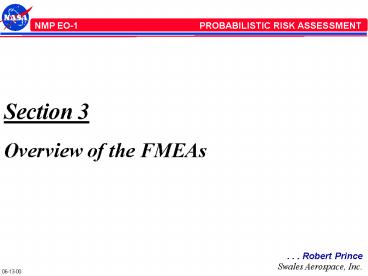MONTHLY PROGRAM STATUS REVIEW - PowerPoint PPT Presentation
1 / 20
Title:
MONTHLY PROGRAM STATUS REVIEW
Description:
... Mode will keep the spacecraft unharmed during any credible Ground System outage ... Safe Hold will keep EO-1 unharmed during Ground System outages ... – PowerPoint PPT presentation
Number of Views:54
Avg rating:3.0/5.0
Title: MONTHLY PROGRAM STATUS REVIEW
1
Section 3 Overview of the FMEAs
. . . Robert Prince Swales Aerospace, Inc.
2
Contents
- Spacecraft Segment
- Advanced Land Imager Instrument
- Ground System Segment
- Launch Vehicle EO-1 Mission-Unique Segment
3
Assumptions For All FMEAs
- One failure at a time
- All required inputs are nominal
- All consumables are present in sufficient
quantities - Nominal power is available (except when the
availability of power is part of the failure(s)
being considered) - Only the launch separation and on-orbit phase of
the mission has been treated - Connector failures are not treated
- (Adapted from GSFC P-302-720 and GSFC S-302-89-01)
4
Failure Severity Criticality Categories for FMEAs
- Severity Criticality Category codes for these
FMEAs are defined as follows - 1 Effective loss of the Mission
(non-recoverable complete loss of ALI data) - 2 Loss of the Hyperion Mission (non-recoverable
complete loss of Hyperion data) - 3 Serious degradation, but still meets some of
the Level I ALI and/or Hyperion requirements - 4 Some degradation or operations impact, but
still achieves the baseline mission - 5 Little or no impact to mission success or
mission operations - Some examples are
- Category 1 Power System, ACS, WARP, or ALI
instrument dying completely - Category 2 Hyperion instrument failing by
itself - Category 3 A Hyperion ASP failure, or an X-Band
Phased Array failure - Category 4 Heaters
- Category 5 PPT, GPS, AC, etc.
- These Criticality Categories are specific for the
EO-1 Mission and should NOT be confused with the
NMP Technology Categorizations
5
EO-1 Redundancy Treatment of Redundancy for
FMEAs
- EO-1 by ground rules is single-string
- Redundancy was included where practical and
affordable - In some cases, multiple identical functions
- Different functions with more-or-less
equivalent results - Multiple channels
- Failure modes with partial or full redundancy are
identified with an R modifier - With redundancy the failure effects indicated in
these FMEAs give the results of the failure as if
there was no redundancy available - Redundancy means that with one failure, the
indicated failure effects do not actually occur - If the redundant function were then to fail (a
second failure), the indicated failure effects
would be observed (excepting the third category
mentioned in the above paragraph where there are
many parallel channels)
6
FMEA Baseline Considerations
- The spacecraft and ALI FMEAs have been performed
post-IT - The spacecraft and ALI FMEAs were in general
conducted at the first level below system box
or major functional level - That first sub level is either an identifiable
circuit card or system function - The launch vehicle FMEA looked only at
mission-unique elements - The ground system FMEA looked only at hardware
system units and data paths
7
FMEA Overview - Spacecraft Segment
8
FMEA Overview - Spacecraft Segment (continued)
9
FMEA Overview - Spacecraft Segment (continued)
10
FMEA Overview - Spacecraft Segment (continued)
11
FMEA Overview - Spacecraft Segment (continued)
12
FMEA Overview - Spacecraft Segment (concluded)
13
FMEA Overview Launch Vehicle Segment,
Mission-Unique Elements
14
FMEA OverviewGround System Segment
- No ground system failures of severity category
worse than 4 - EO-1s robust Safe Hold Mode will keep the
spacecraft unharmed during any credible Ground
System outage - All ground system equipment is commercial
- Maintenance contracts exist for all ground system
equipment - Spares and/or alternative data flow paths exist
for all ground system equipment - The one exception is a tape drive in the MOC
(Building 14) used to read science tapes - For this case, the tapes can be re-read after
maintenance no data loss - Consideration is being given to obtaining a
back-up tape drive
15
Redundancies Work-Arounds OverviewSpacecraft
Segment
16
Redundancies Work-Arounds OverviewSpacecraft
Segment (Continued)
17
Redundancies Work-Arounds OverviewSpacecraft
Segment (Continued)
18
Redundancies Work-Arounds OverviewSpacecraft
Segment (Continued)
19
Redundancies Work-Arounds OverviewSpacecraft
Segment (Concluded)
20
Final Summary of FMEAs
- Spacecraft Systems FMEA
- Solar Array Loss of a string can be tolerated
- Solar Array Drive Not required for Minimum
Mission - PSE Some internal work-arounds available
- S-Band Comm Non-redundant Command Control
Receiver - 1773 Data Bus Redundant fibers, Star Couplers,
and Transceivers - CDH Mostly non-redundant
- ACS Mostly non-redundant
- Propulsion Not required for Minimum Mission
- WARP Some internal partial redundancies
- X-Band Transmit Not required for Minimum
Mission - ALI Some internal partial redundancies
- Other Hardware and Instruments Not required for
Minimum Mission - Launch Vehicle Mission-Uniques FMEA
- EO-1 Separation from DPAF Bolt Cutters and
Wiring are redundant - Ground System FMEA
- Spares and alternative data paths
- Safe Hold will keep EO-1 unharmed during Ground
System outages































